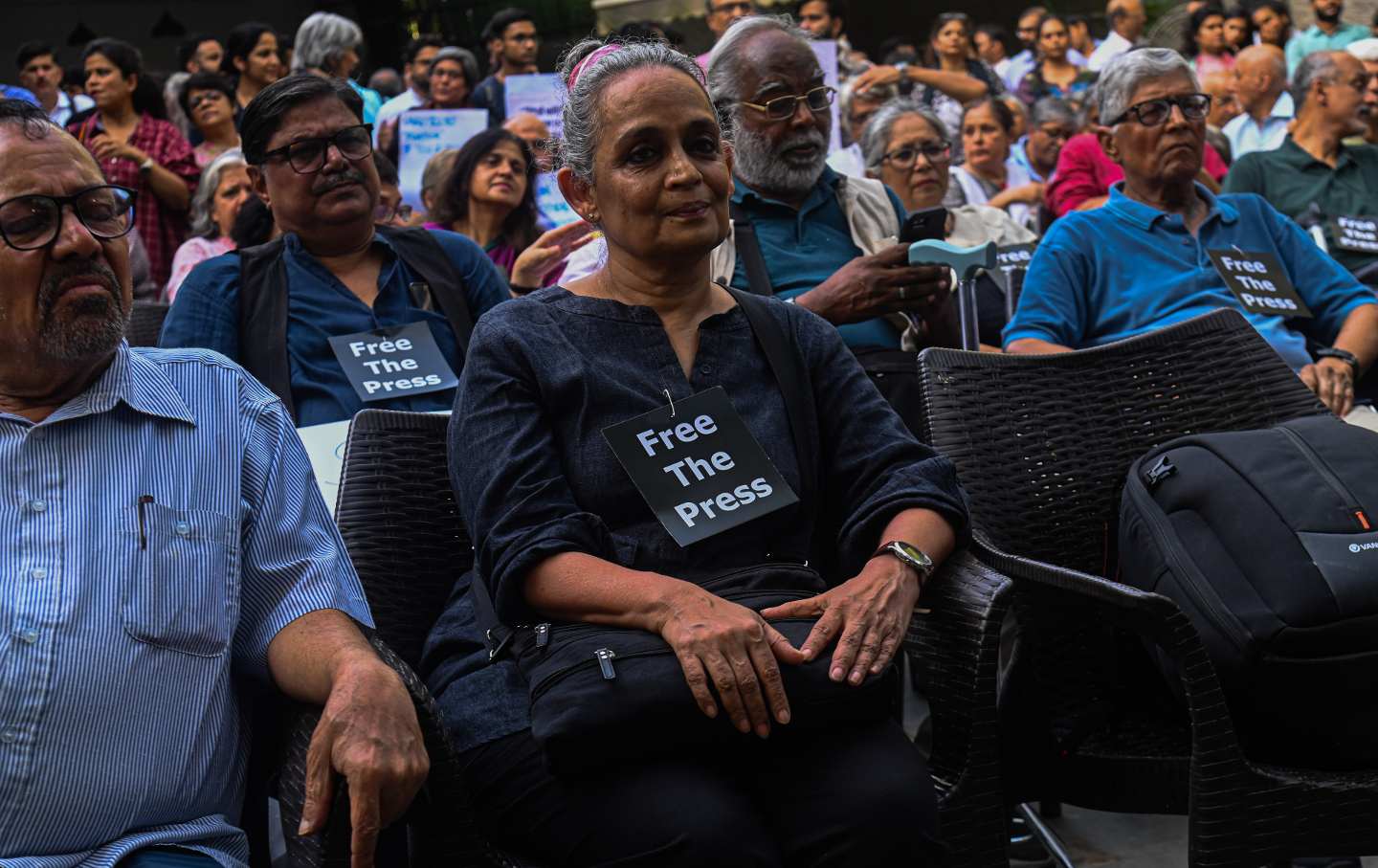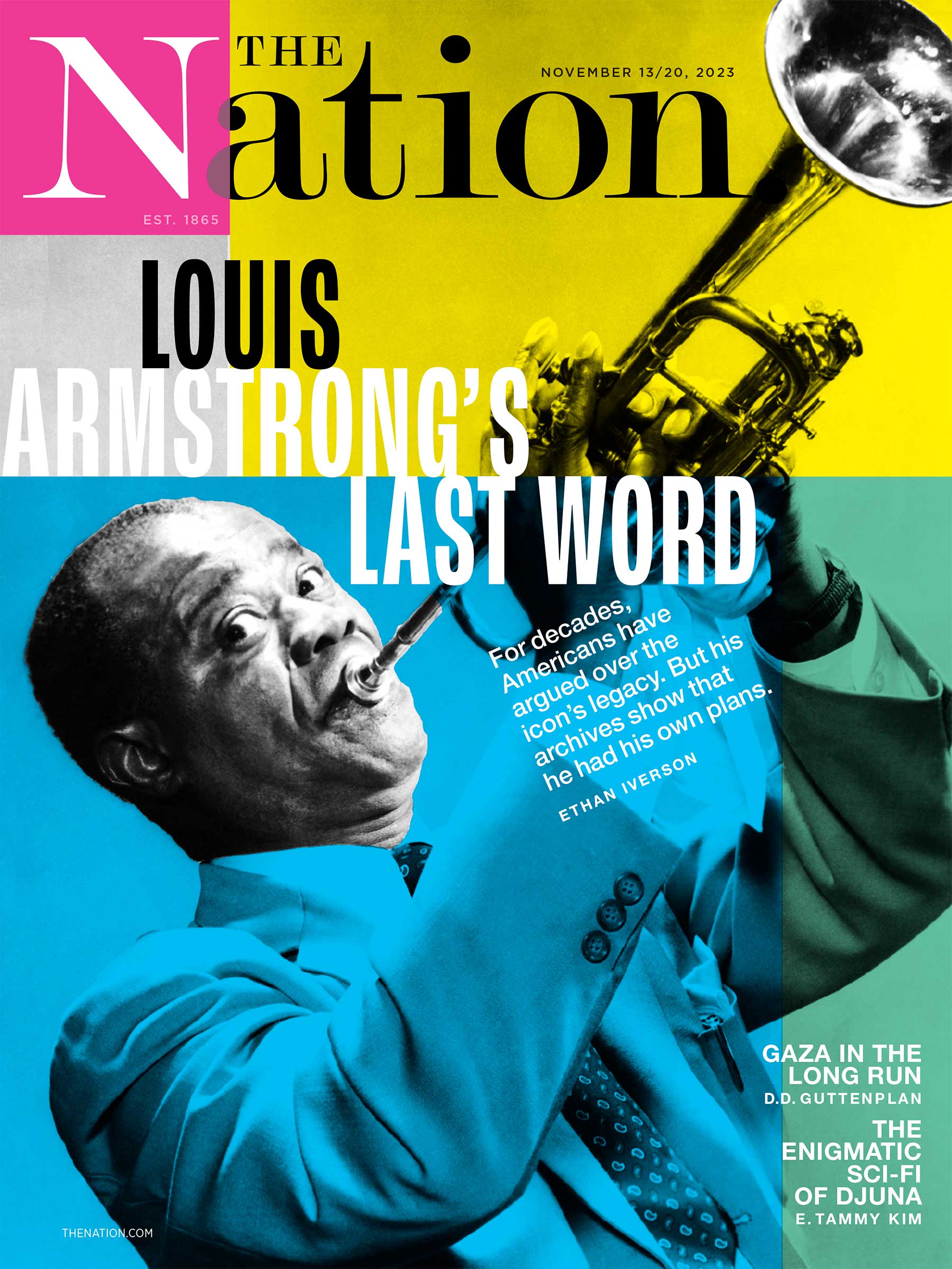[ad_1]
By publishing a flimsy, Red-baiting scare story, the paper allowed the Modi authorities to crack down on among the nation’s most essential unbiased voices.

Arundhati Roy attends a protest in opposition to the raids of properties of journalists and writers belonging a information portal in New Delhi, India, on October 04, 2023.
(Kabir Jhangiani / NurPhoto by way of Getty Images)
The Indian authorities has an elephant’s reminiscence and a newt’s pores and skin. Arundhati Roy, the Booker Prize–successful creator, has as soon as once more been charged with sedition in a revival of a 2010 case in opposition to her and former professor Sheikh Showkat Hussain. She joins nearly 50 people related to the unbiased journalism web site Newsclick who’ve been topic to the Indian authorities’s crackdown on freedom of speech. Whether due to Roy’s long-standing opposition to successive administrations’ remedy of the poor, or for Newsclick’s current, internationally circulated protection of farmers’ protests, the Indian authorities is acutely delicate to modifications in its working atmosphere. Words reduce Prime Minister Narendra Modi deep, and now the administration is preventing again. These are the worst assaults on India’s fourth property since Indira Gandhi’s 1975–77 Emergency Period—and so they have been made attainable by The New York Times.
The Indian authorities has justified its NewsClick crackdown on the grounds that “funds have been fraudulently infused by one Neville Roy Singham, active member of propaganda department of Communist Party of China.” And how did the federal government come to study of those supposed connections? Through an August New York Times article titled “A Global Web of Chinese Propaganda Leads to a U.S. Tech Mogul.”
Singham lives in China, however he’s neither a celebration member nor an worker of the Chinese authorities. The Times’ proof that he may be a puppet of the Chinese authorities included his being retweeted by Chinese state media and sitting close to a Communist Party official whereas “jotting in a notebook adorned with a red hammer and sickle.” Also, his dwelling is seemingly outfitted with an “always follow the party” banner and a Xi Jinping plate. It’s a traditional case of innuendo posing as journalism.
Times reporters were told categorically that the charitable group funding Newsclick had by no means obtained funding from “from any foreign individual, organisation, political party, or government (or from any of their members or representatives.” Roy can’t be a member of the Chinese Communist Party because he’s not Chinese. The paper didn’t embody these details. Absent any proof on the contrary, the Times merely ignored them. The reporting contained no particular fees. The paper merely inspired readers to take a look at some factoids—after which squint to conjure their very own fantasies of malfeasance. The Indian authorities obliged.
Journalism in India has by no means been an occupation for the faint-hearted. British colonial-era legal guidelines give the federal government sweeping powers over freedom of speech. The Modi administration has, nevertheless, been extra brazen within the concentrating on of its perceived enemies. Under a 2019 modification to the Unlawful Activities (Prevention) Act, the Indian authorities can designate people as terrorists, with out proof. Delhi police cited this law in its fees in opposition to Prabir Purkayastha and Amit Chakravarty, Newsclick’s founding editor in chief and head of human assets, respectively. Purkayastha has been a stalwart of the Indian left, and is especially involved with democratizing science; he based the Free Software Movement of India in 2010.
Roy in flip is accused of “provoking enmity between groups,” “imputations prejudicial to national integration,” and “public mischief.” All this for observing in a 2010 seminar that the Indian authorities itself didn’t suppose that the disputed territory of Kashmir was “an integral part of India.” Roy and Newsclick are removed from alone. In February this 12 months, the places of work of the BBC in Delhi and Mumbai had been raided, telephones and computer systems confiscated, and journalists inspired to complete a survey following the discharge of a BBC documentary important of Modi and his Bharatiya Janata Party (BJP). Before them, several other Indian journalists had been charged and imprisoned for his or her reporting.
Modi’s anxieties mirror these of his administration: neuroses in regards to the South Asian diaspora, inferiority to China, home dissent, and the probabilities of criticism on the worldwide stage. Newsclick led the reporting in regards to the single greatest embarrassment that Modi has confronted: the world’s largest protest over legal guidelines to decontrol agriculture. The Times piece was catnip to the BJP mandarins.
Under different circumstances, the Times would possibly moderately declare to not have been in a position to anticipate the Indian authorities’s weaponizing of its reporting in opposition to Indian journalists. But the Times was told what the implications of their reporting can be for the Indian press in no unsure phrases by one among Newsclick’s contributors, Kavita Krishnan, through the course of their analysis. (Yes, she’s additionally a member of the Indian Communist Party—a totally authorized group.)
We don’t have any quarrel with good journalism. Philanthropy itself is profoundly antidemocratic and deserves the complete scrutiny of the fourth property. The Gates Foundation, as an example, funded the Alliance for a Green Revolution in Africa (AGRA) in a billion-dollar effort to fight starvation in 13 nations. Eight years later, starvation was up by 30 p.c and AGRA has modified its title, in order that it’s now not an acronym; it now stands for nothing at all. This is a subject that richly deserves Times protection, nevertheless it chooses to focus as an alternative on a nonexistent Chinese-funded conspiracy.
We supply the Gates Foundation instance not as a result of we’re training a generalized whataboutism however as a result of we battle for good explanation why the Times would possibly publish a bit that’s based mostly on such flimsy materials figuring out that fellow journalists would undergo. Perhaps it’s to indicate the suitable that it’s being “evenhanded” and is able to additionally roasting the left because it skewers Donald Trump and his allies. But this false equivalence vastly underestimates the menace from the suitable to American liberal democracy.
To us, it makes extra sense to know the Times as supine. It has adopted the contours of liberal dominion, reporting on a millionaire however ignoring a billionaire, even when that reporting comes at the price of these risking their lives to talk fact. If India is a thin-skinned behemoth, maybe the Times is a wrasse, choosing clear the tooth of sharks, hoping that its service to the highly effective will reserve it from changing into a meal itself.
[adinserter block=”4″]
[ad_2]
Source link
